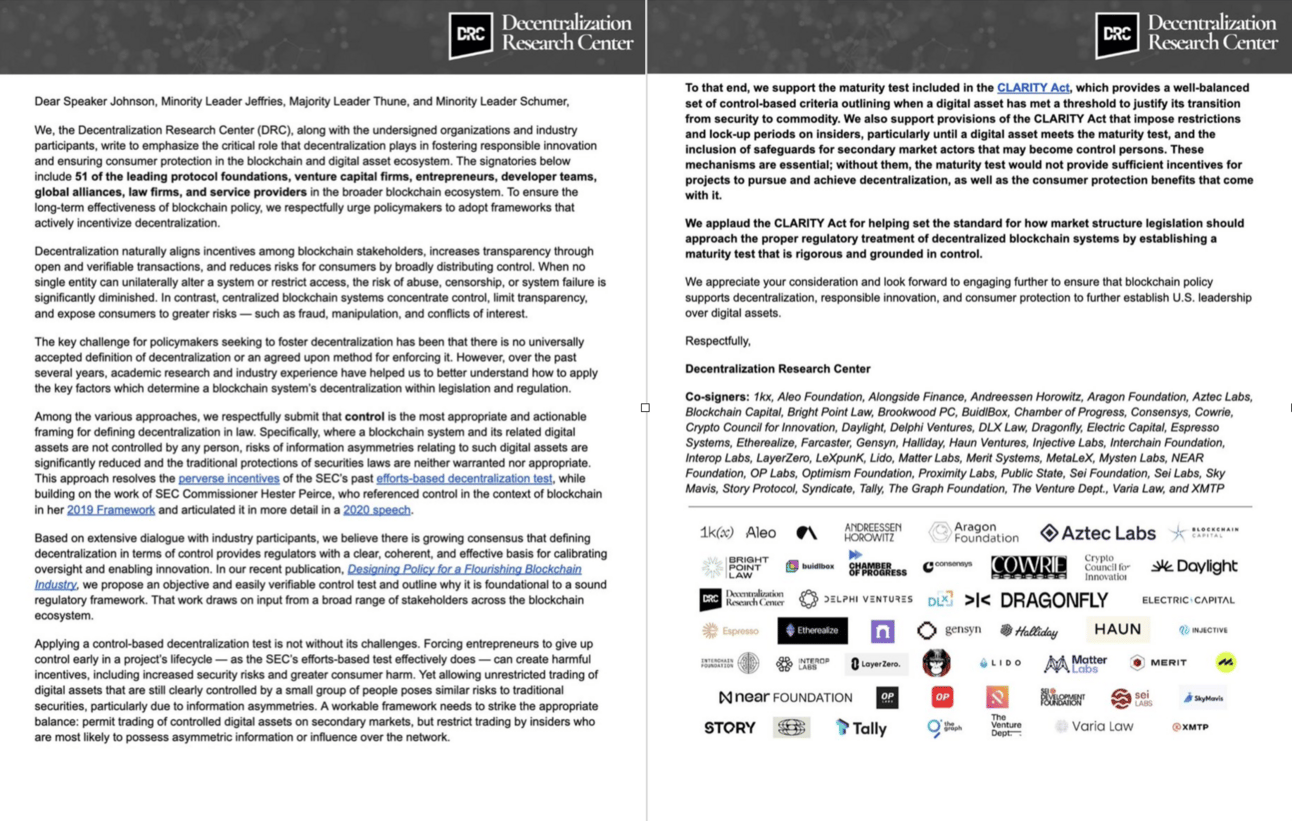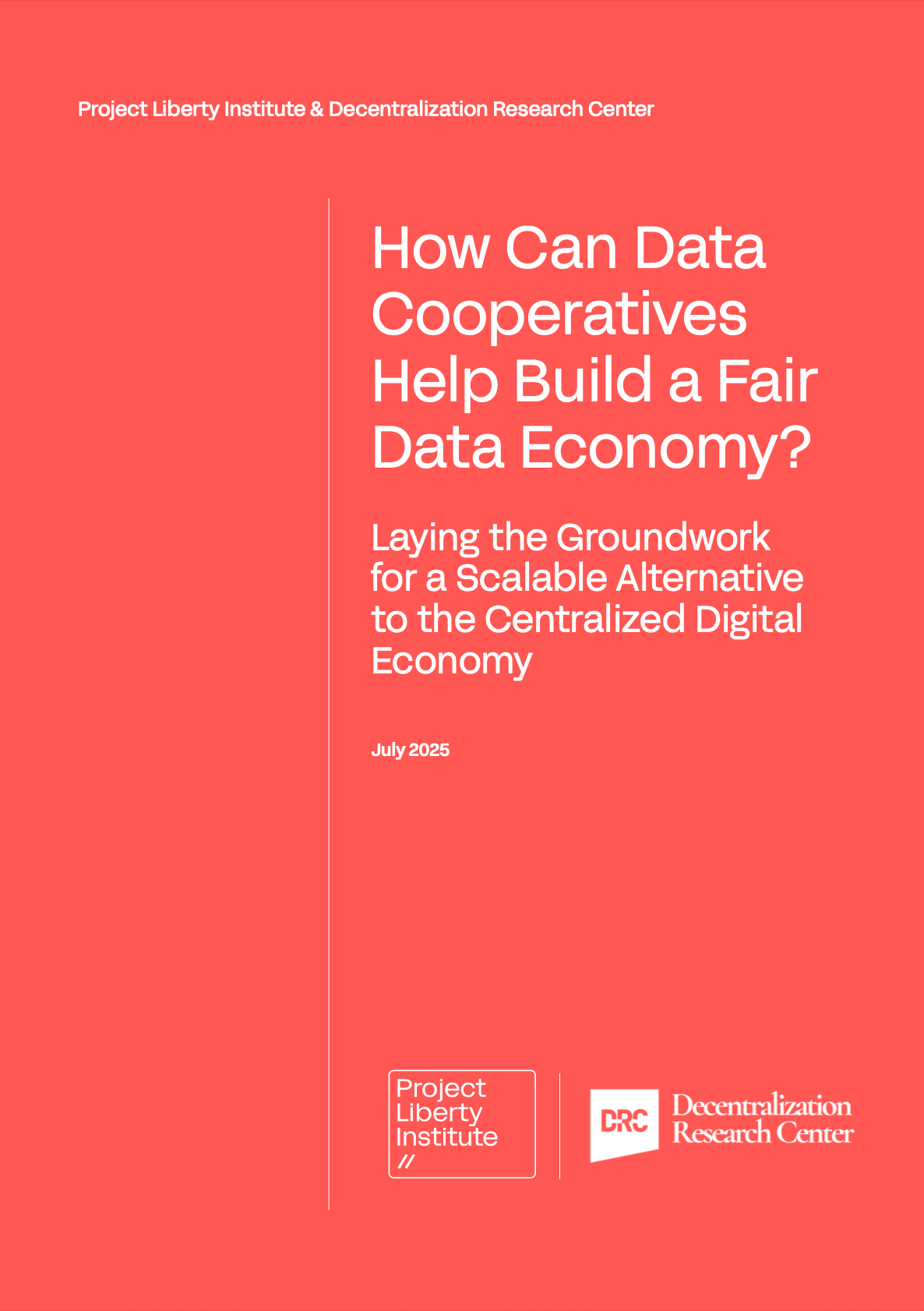- DRC Monthly Update
- Posts
- 🔬 DRC: July Report
🔬 DRC: July Report
Data Cooperatives, the DRC Blog, Letters to Congress, and more.
Welcome to the Decentralization Research Center report, a monthly briefing on events and research relevant to decentralization, DAOs and governance.
This Month’s Updates
Key Notes
On Monday, the DRC and 50 other leading stakeholders in the blockchain industry delivered a joint letter to Congressional leadership in support of the CLARITY Act’s robust, control-based decentralization test for digital assets. This is the largest coalition of organizations in agreement on a particular test for decentralization.
The CLARITY Act establishes a much-needed standard for evaluating when a digital asset has met a threshold to justify its transition from security to commodity — an essential step for effective market structure legislation. Thank you to all of our cosigners.
Want to add your voice? Email [email protected] to join the coalition in support of decentralization.

Today, we are excited to launch the DRC blog with a guest post from fellow Kelsie Nabben, who writes from behind the scenes of the world’s largest hack and explains the current endemic nature of crypto hacks. If you have something to add to the conversation and wish to contribute, please feel free to reach out to [email protected].
And, this month, we released a report on data cooperatives with the Project Liberty Institute, exploring how cooperatives can help address one of the most pressing challenges of the digital era: how we can return value to the people, communities, and organizations that generate data. Developed through a series of expert and practitioner consultations combined with real-world case studies, we brought together insights from cooperative leaders, technologists, academics, and policy experts to offer alternatives to the centralized digital economy.
The Full Rundown
Other stories and research we’ve been tracking for you:
In looking to see how close blockchain could come to competing with centralized businesses like Mastercard and Visa, Hypha Worker Co-op used experimental data to increase a blockchain’s transactions per second by 35%.
This position paper argues that democratic AI is both possible and preferable to current systems. It also provides a "Democracy Levels" framework and associated tools that define milestones toward meaningfully democratic AI, help organizations deal with difficult AI governance questions, and help in evaluating those efforts. Led by Aviv Ovadya.
Jeff Strnad proposes a new form of DAO governance that uses a sequential auction mechanism to overcome entrenched control issues. This mechanism not only facilitates the ability of DAOs to meet their normative and operational goals in the face of diverse regulatory approaches, but also strengthens the case for creating a less burdensome but at least equally effective regulatory regime for DAOs that employ the mechanism.
Glen Weyl, Audrey Tang, and Jacob Mchangama look back to 1947 and the results of the Hutchins commission on press freedom and responsibility for answers to how to make today’s media landscape more prosocial.
Nicholas Vincent, Matthew Prewitt, and Hanlin Li argue that without increased market coordination or collective bargaining on the side of information producers, such as journalists, researchers, and creative professionals, AI will exacerbate a large-scale "information market failure" that will lead not only to undesirable concentration of capital, but also to a potential "ecological collapse" in the informational commons.
Botao Amber Hu, Yuhan Liu, and Helena Rong look at how DeAgents eliminate centralized control and reduces human intervention, addressing key trust concerns inherent in centralized AI systems. However, given ongoing challenges in LLM reliability such as hallucinations, this creates a paradoxical tension between trustlessness and unreliable autonomy.
Júlia Martins Rodrigues and Nathan Schneider argue that shared ownership of companies by workers, consumers, neighbors, or other groups of direct participants, means that responsibilities and rewards of ownership can be distributed throughout society rather than concentrated in the hands of a financial elite, resulting in more democratic governance and shared prosperity.
Jane Khodarkovsky, a former federal prosecutor who is now a partner at Arktouros, and Nikhil Raghuveera, co-founder and CEO of Predicate, join the Decentralization Research Center’s Tony Douglas to discuss regulation by enforcement, developer liability, privacy tools, AI agents, and how to responsibly build the next generation of financial infrastructure.
How does bipartisan education occur in Washington? Where can it be improved? George Leonardo (@CapHillCrypto) of Cap Hill Crypto joins the Techquitable podcast to discuss what he's seeing on the Hill.
If you’re working on related research or would like to get involved in our work, please reach out to us via [email protected]. We’d love to hear from you!
Connor Spelliscy
Executive Director
Decentralization Research Center


